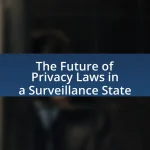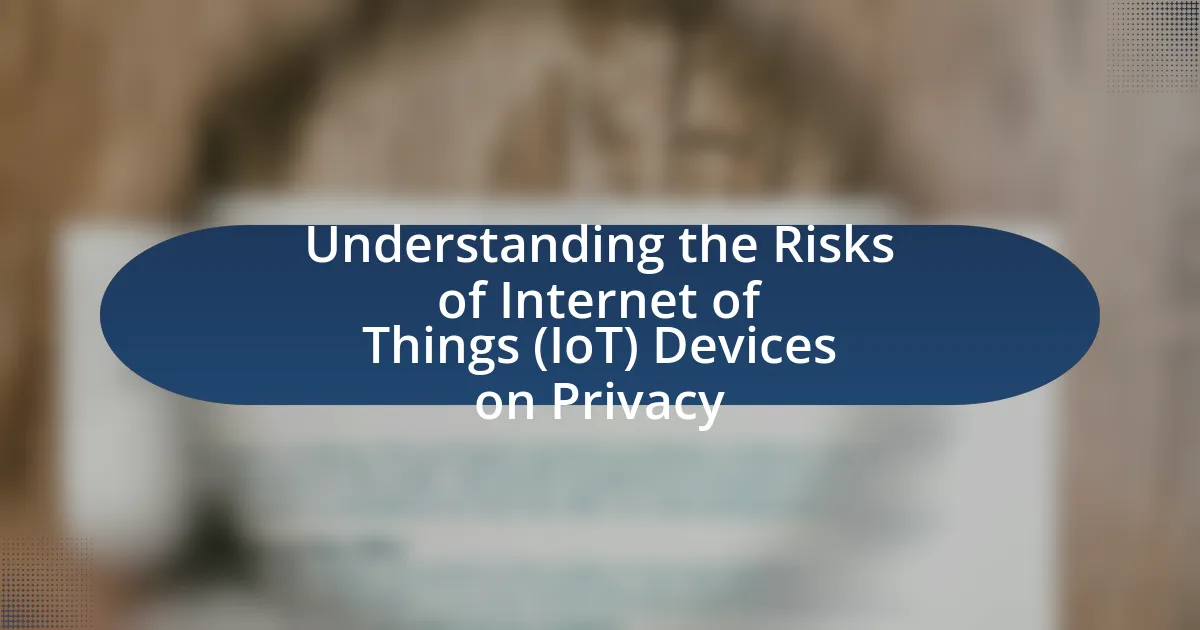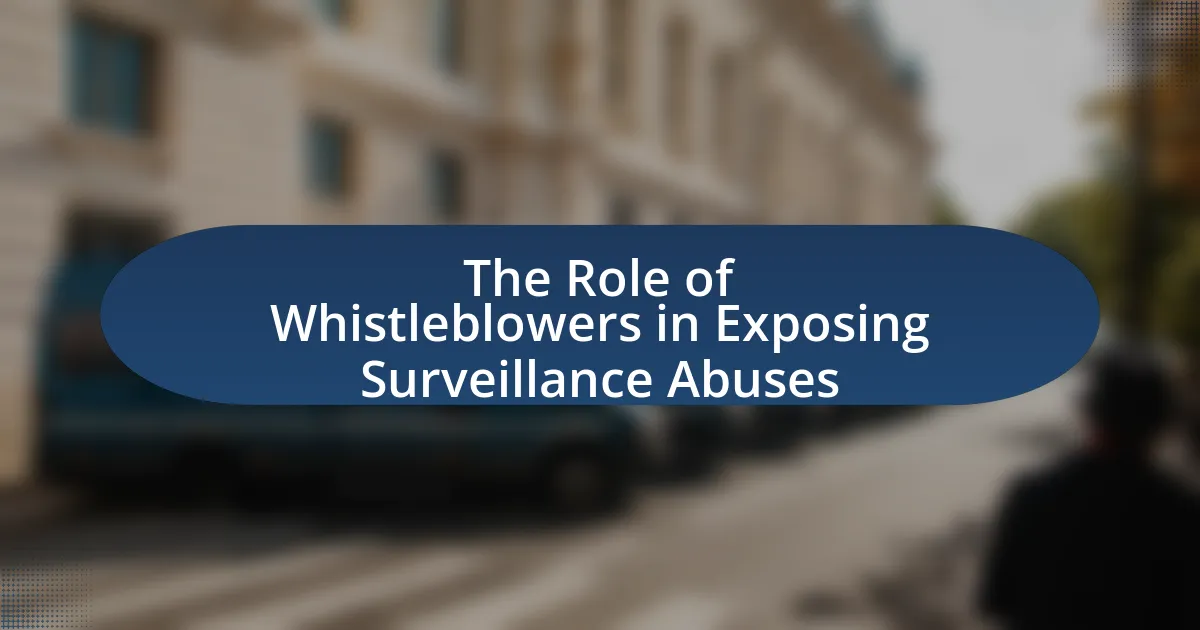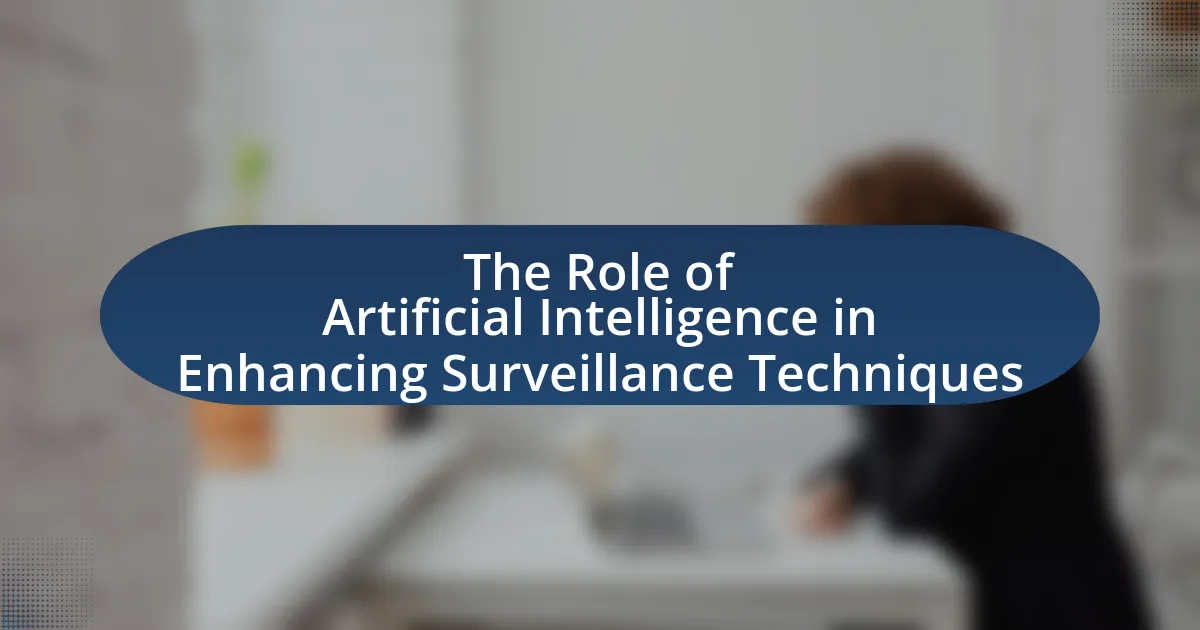Public sentiment on surveillance reflects a complex interplay between privacy concerns and perceived security benefits, with significant variations across different cultures and regions. A 2021 Pew Research Center survey indicated that 81% of Americans believe the risks of government surveillance outweigh its benefits, highlighting widespread apprehension about privacy violations. The article explores how public sentiment is measured globally, the methodologies used in surveys, and the cultural, socio-economic, and historical factors that shape attitudes towards surveillance. It also discusses the implications of public opinion on policy-making and the development of surveillance technologies, emphasizing the importance of transparency and accountability in fostering trust.
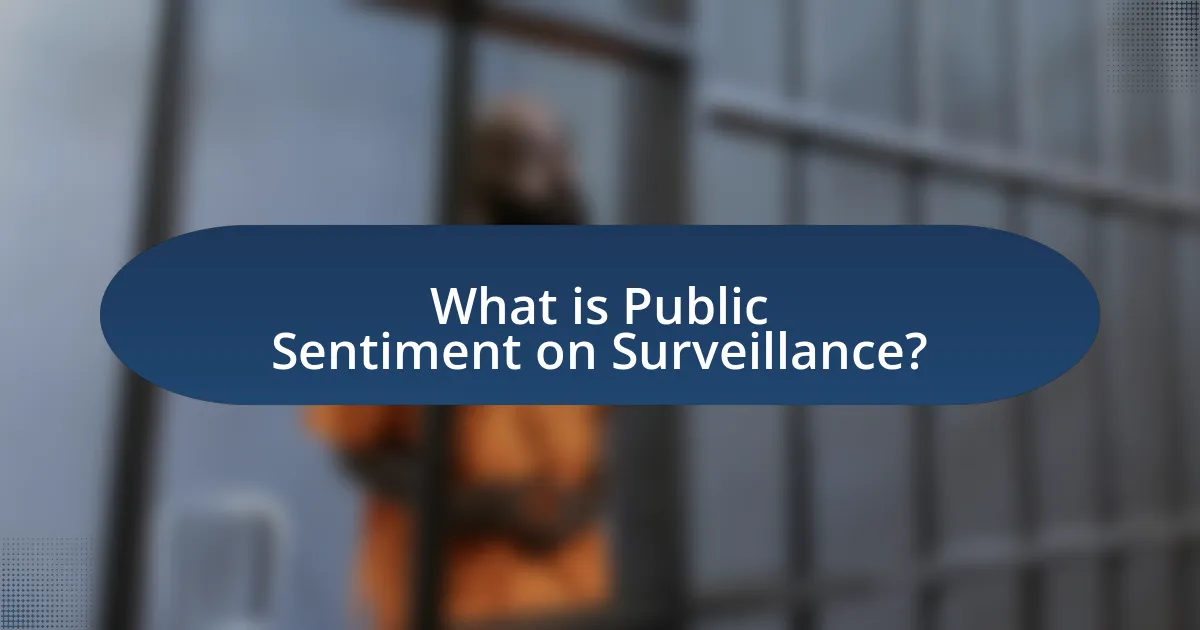
What is Public Sentiment on Surveillance?
Public sentiment on surveillance is largely mixed, with significant concerns about privacy and civil liberties alongside perceived benefits for security and crime prevention. According to a 2021 Pew Research Center survey, 81% of Americans feel that the risks of surveillance by the government outweigh the benefits, indicating a strong apprehension about privacy violations. Conversely, some studies show that a portion of the public supports surveillance measures when they believe it enhances safety, particularly in urban areas with high crime rates. This duality reflects a complex relationship where individuals weigh personal privacy against collective security needs.
How is public sentiment on surveillance measured globally?
Public sentiment on surveillance is measured globally through surveys, polls, and studies that assess individuals’ attitudes towards government and corporate surveillance practices. For instance, the Pew Research Center conducts regular surveys that gauge public opinion on privacy and surveillance, revealing trends in how people perceive the balance between security and privacy. Additionally, organizations like Amnesty International and Privacy International publish reports that analyze public sentiment based on regional studies and focus groups, providing insights into varying attitudes across different cultures and political contexts. These methodologies ensure a comprehensive understanding of global perspectives on surveillance.
What methodologies are used to gauge public opinion on surveillance?
Surveys and polls are the primary methodologies used to gauge public opinion on surveillance. These tools collect quantitative data from a representative sample of the population, allowing researchers to analyze attitudes towards surveillance practices. For instance, a Pew Research Center survey in 2021 found that 81% of Americans felt that the risks of surveillance by the government outweighed the benefits. Additionally, focus groups and interviews provide qualitative insights, revealing deeper sentiments and concerns about privacy and security. These methodologies collectively offer a comprehensive understanding of public sentiment regarding surveillance.
How do cultural factors influence survey results on surveillance?
Cultural factors significantly influence survey results on surveillance by shaping individuals’ perceptions, attitudes, and acceptance levels regarding monitoring practices. For instance, in collectivist cultures, there may be a higher tolerance for surveillance due to a greater emphasis on community safety and social order, as seen in countries like China, where public support for surveillance is often linked to perceived benefits in security and crime reduction. Conversely, in individualistic cultures, such as those in many Western nations, there tends to be a stronger emphasis on personal privacy and civil liberties, leading to more critical views on surveillance practices. Research conducted by the Pew Research Center indicates that attitudes towards surveillance vary widely across different cultural contexts, highlighting how local norms and values directly impact public sentiment and responses in surveys.
Why is public sentiment on surveillance important?
Public sentiment on surveillance is important because it influences policy decisions and the implementation of surveillance technologies. When the public expresses concern about privacy and civil liberties, policymakers are more likely to consider these factors in legislation, as seen in various countries where public outcry has led to stricter regulations on surveillance practices. For instance, the backlash against the NSA’s mass surveillance programs in the United States prompted reforms aimed at increasing transparency and accountability. Thus, understanding public sentiment is crucial for balancing security needs with individual rights.
What implications does public sentiment have on policy-making?
Public sentiment significantly influences policy-making by shaping the priorities and decisions of lawmakers. When a majority of the public expresses strong opinions on issues, such as surveillance practices, policymakers often respond to these sentiments to maintain electoral support and legitimacy. For instance, in the wake of Edward Snowden’s revelations about NSA surveillance, public outcry led to legislative changes, including the USA Freedom Act of 2015, which aimed to limit government surveillance powers. This demonstrates that when public sentiment is vocal and widespread, it can compel policymakers to reconsider and amend existing laws to align with the views and concerns of their constituents.
How does public opinion shape the development of surveillance technologies?
Public opinion significantly influences the development of surveillance technologies by driving policy decisions and shaping market demand. When citizens express concerns about privacy and civil liberties, governments and companies often respond by modifying or limiting surveillance initiatives to align with public sentiment. For instance, the backlash against mass surveillance programs revealed by Edward Snowden in 2013 led to increased scrutiny and legislative changes in various countries, such as the USA Freedom Act, which aimed to curtail the National Security Agency’s data collection practices. Additionally, consumer preferences for privacy-focused technologies have prompted companies to innovate and offer products that prioritize user data protection, demonstrating that public opinion can directly impact the trajectory of surveillance technology development.
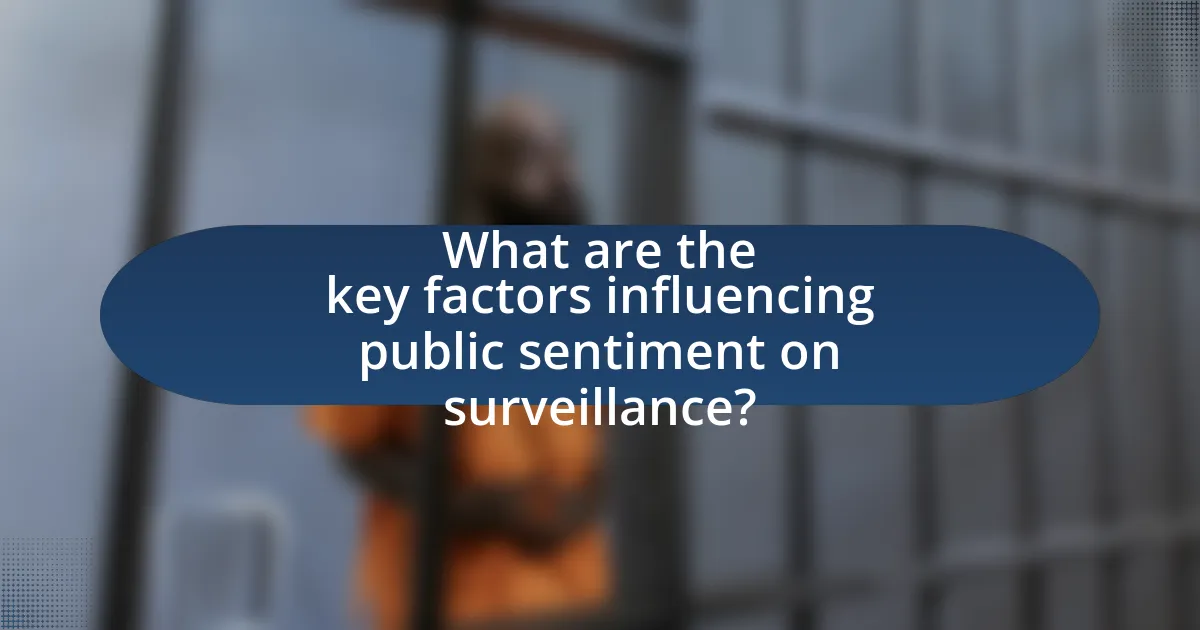
What are the key factors influencing public sentiment on surveillance?
Key factors influencing public sentiment on surveillance include privacy concerns, perceived effectiveness in crime prevention, trust in government and institutions, and cultural attitudes towards surveillance. Privacy concerns arise from the fear of personal data misuse, as evidenced by surveys indicating that a significant portion of the population is uncomfortable with government monitoring. The perceived effectiveness of surveillance in enhancing safety can lead to more favorable views, with studies showing that communities often support surveillance measures when they believe they reduce crime rates. Trust in government plays a crucial role; higher trust levels correlate with more positive sentiments towards surveillance initiatives. Additionally, cultural attitudes vary globally, with some societies more accepting of surveillance as a norm, influenced by historical contexts and social values.
How do privacy concerns affect public attitudes towards surveillance?
Privacy concerns significantly shape public attitudes towards surveillance by fostering distrust and resistance to monitoring practices. When individuals perceive that their privacy is at risk, they often express opposition to surveillance measures, believing these infringe on personal freedoms and civil liberties. For instance, a 2021 Pew Research Center survey found that 81% of Americans feel that the potential risks of data collection by companies outweigh the benefits, indicating a strong inclination towards privacy protection. This sentiment leads to calls for stricter regulations and transparency regarding surveillance technologies, as people demand accountability from both governments and corporations.
What specific privacy issues are most concerning to the public?
The specific privacy issues most concerning to the public include data breaches, government surveillance, and the misuse of personal information by corporations. Data breaches have affected millions, with a report from IBM indicating that the average cost of a data breach in 2023 is $4.45 million, highlighting the financial and personal risks involved. Government surveillance raises alarms about civil liberties, as evidenced by the Pew Research Center’s 2021 survey, which found that 81% of Americans feel that the potential risks of companies collecting data on them outweigh the benefits. Additionally, the misuse of personal information, particularly in targeted advertising and social media manipulation, has led to widespread distrust, with a 2022 study by the Data & Society Research Institute revealing that 60% of respondents are concerned about how their data is used without their consent.
How do recent data breaches impact public trust in surveillance systems?
Recent data breaches significantly diminish public trust in surveillance systems. When individuals learn about breaches, such as the 2021 Facebook leak affecting over 500 million users, they become increasingly skeptical about the security and privacy of their personal information. This skepticism is supported by surveys indicating that 81% of Americans feel they have little control over their personal data, leading to a decline in confidence in systems designed to monitor and protect them. Consequently, as breaches continue to occur, public sentiment shifts towards viewing surveillance systems as potential threats rather than protective measures.
What role does government transparency play in shaping public sentiment?
Government transparency significantly influences public sentiment by fostering trust and accountability between citizens and their government. When governments operate transparently, they provide citizens with access to information regarding policies, decisions, and actions, which can lead to increased public confidence. For instance, a study by the World Bank found that higher levels of government transparency correlate with greater citizen trust and engagement, as transparency reduces perceptions of corruption and promotes a sense of inclusion in the democratic process. This relationship indicates that when citizens feel informed and involved, they are more likely to support government initiatives and policies.
How does the level of government accountability influence public trust?
The level of government accountability significantly influences public trust by establishing transparency and fostering a sense of reliability among citizens. When governments are accountable, they are more likely to engage in open communication, provide clear explanations for their actions, and address public concerns, which enhances trust. For instance, a study by the World Bank found that higher levels of government accountability correlate with increased public trust in institutions, as citizens feel more secure in their rights and the integrity of governance. This relationship underscores the importance of accountability mechanisms, such as audits and public reporting, in building a trustworthy government-citizen relationship.
What examples illustrate the impact of transparency on public opinion?
Transparency significantly influences public opinion, as evidenced by the response to the Edward Snowden revelations in 2013. Following the disclosure of extensive government surveillance programs, public trust in government institutions plummeted, with a Pew Research Center survey indicating that 70% of Americans felt that the government was not doing enough to protect their privacy. Additionally, the release of the Panama Papers in 2016 led to widespread outrage and calls for accountability, resulting in protests and policy changes in various countries, demonstrating how transparency can mobilize public sentiment and demand for reform.
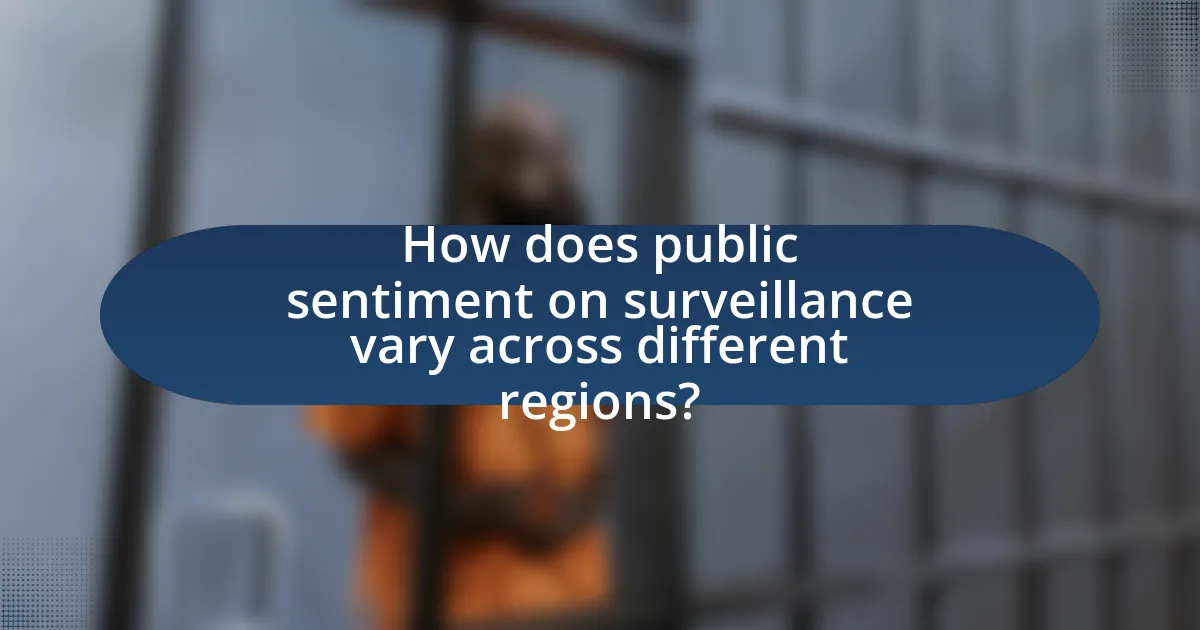
How does public sentiment on surveillance vary across different regions?
Public sentiment on surveillance varies significantly across different regions, influenced by cultural, political, and historical contexts. In Europe, for instance, there is a strong emphasis on privacy rights, largely due to stringent regulations like the General Data Protection Regulation (GDPR), which reflects a general skepticism towards surveillance practices. Conversely, in countries like China, public sentiment tends to be more accepting of surveillance, as it is often associated with safety and social stability, supported by government narratives that prioritize collective security over individual privacy. Surveys, such as those conducted by Pew Research Center, indicate that in the United States, opinions are mixed; while many express concerns about government overreach, a substantial portion also supports surveillance for national security purposes. These regional differences highlight how local values and governance shape public attitudes towards surveillance.
What are the differences in public sentiment on surveillance between Western and Eastern countries?
Public sentiment on surveillance differs significantly between Western and Eastern countries, primarily due to cultural values and historical contexts. In Western countries, such as the United States and many European nations, there is a strong emphasis on individual privacy rights and civil liberties, leading to skepticism and opposition towards government surveillance programs. For instance, a 2020 Pew Research Center survey indicated that 81% of Americans felt that the risks of government surveillance outweighed the benefits.
Conversely, in many Eastern countries, such as China and Singapore, public sentiment tends to be more accepting of surveillance, often viewing it as a necessary measure for security and social stability. In China, for example, a 2021 survey by the Chinese Academy of Social Sciences found that over 70% of respondents supported government surveillance initiatives, associating them with crime reduction and public safety. This divergence in sentiment reflects broader societal attitudes towards authority, governance, and the role of the state in individual lives.
What cultural factors contribute to these differences?
Cultural factors that contribute to differences in public sentiment on surveillance include historical context, societal values, and levels of trust in government. For instance, countries with a history of authoritarian regimes, such as China, often exhibit higher acceptance of surveillance due to a cultural emphasis on collective security over individual privacy. In contrast, nations like Germany, shaped by historical experiences with state surveillance during the Nazi and East German eras, tend to prioritize privacy and exhibit skepticism towards government monitoring. Additionally, cultural values such as individualism versus collectivism influence perceptions; societies that value individual rights may resist surveillance, while those that prioritize community welfare may support it. These factors collectively shape how different populations perceive and react to surveillance practices.
How do historical contexts shape attitudes towards surveillance in various regions?
Historical contexts significantly shape attitudes towards surveillance in various regions by influencing public perception based on past experiences with government authority and privacy violations. For instance, in countries with histories of authoritarian regimes, such as East Germany, citizens often exhibit skepticism towards surveillance due to memories of state-sponsored monitoring and repression, as evidenced by the Stasi’s extensive surveillance practices. Conversely, in nations with democratic traditions, like the United States, attitudes may vary; while some citizens support surveillance for national security, others express concern over privacy infringements, particularly following events like the Edward Snowden revelations in 2013, which highlighted government overreach. These historical experiences create a framework through which individuals interpret current surveillance practices, leading to diverse attitudes shaped by the legacy of past governance and societal values.
How do socio-economic factors influence public sentiment on surveillance?
Socio-economic factors significantly influence public sentiment on surveillance by shaping individuals’ perceptions of privacy, security, and trust in government. For instance, individuals from lower socio-economic backgrounds may prioritize security over privacy due to higher exposure to crime, leading to greater acceptance of surveillance measures. Conversely, those in higher socio-economic strata often have more resources and education, which can foster skepticism towards government surveillance, viewing it as an infringement on civil liberties. Research conducted by the Pew Research Center in 2019 found that 64% of Americans with lower incomes expressed support for increased surveillance for safety, while only 45% of higher-income individuals felt the same way. This disparity illustrates how socio-economic status directly correlates with attitudes towards surveillance, highlighting the complex interplay between economic conditions, personal experiences, and public sentiment.
What is the relationship between income levels and attitudes towards surveillance?
Income levels significantly influence attitudes towards surveillance, with higher-income individuals often exhibiting greater acceptance of surveillance measures. Research indicates that wealthier populations tend to prioritize security and privacy, leading them to support surveillance as a means of enhancing safety. For instance, a study by the Pew Research Center found that 70% of individuals with higher incomes believe that surveillance technologies improve public safety, compared to only 50% of lower-income individuals who express similar sentiments. This disparity suggests that economic status shapes perceptions of surveillance, where financial stability correlates with a more favorable view of surveillance practices.
How does education level affect public perception of surveillance practices?
Education level significantly influences public perception of surveillance practices, with higher education often correlating to increased skepticism about government surveillance. Research indicates that individuals with advanced degrees tend to be more aware of privacy issues and the implications of surveillance technologies, leading them to question the necessity and effectiveness of such practices. For instance, a study published in the journal “Surveillance & Society” found that educated individuals are more likely to advocate for privacy rights and express concerns about civil liberties being compromised by surveillance measures. This trend suggests that education equips individuals with critical thinking skills and knowledge about the potential risks associated with surveillance, shaping their attitudes towards its implementation.
What trends are emerging in public sentiment on surveillance?
Emerging trends in public sentiment on surveillance indicate a growing concern over privacy and data security. Recent surveys show that a significant portion of the population, particularly in democratic nations, expresses skepticism about government and corporate surveillance practices. For instance, a 2022 Pew Research Center study found that 81% of Americans feel that the risks of data collection by companies outweigh the benefits. Additionally, there is an increasing demand for transparency and accountability in surveillance practices, with many advocating for stricter regulations to protect individual privacy rights. This shift reflects a broader awareness of the implications of surveillance technology on civil liberties and personal freedoms.
How has public sentiment shifted in response to recent global events?
Public sentiment has shifted towards increased concern regarding surveillance in response to recent global events, particularly the COVID-19 pandemic and geopolitical tensions. Surveys indicate that many individuals now prioritize privacy and data protection, with a significant rise in skepticism towards government surveillance measures. For instance, a 2021 Pew Research Center study found that 81% of Americans feel that the risks of surveillance by the government outweigh the benefits, reflecting a growing unease about personal privacy in the face of heightened monitoring. This shift is further evidenced by protests and public discourse advocating for stronger privacy regulations and transparency in surveillance practices.
What future trends can be anticipated in public attitudes towards surveillance?
Future trends in public attitudes towards surveillance indicate a growing concern for privacy and data security, alongside an increasing acceptance of surveillance for safety and security purposes. As technology advances, individuals are becoming more aware of the implications of surveillance, leading to heightened demands for transparency and accountability from governments and corporations. Research by the Pew Research Center in 2021 found that 81% of Americans feel that the potential risks of companies collecting data about them outweigh the benefits, reflecting a significant shift towards skepticism regarding surveillance practices. Additionally, younger generations, who are more digitally savvy, are likely to advocate for stronger privacy protections, influencing policy changes and corporate practices in the coming years.
What can be done to address public concerns about surveillance?
To address public concerns about surveillance, implementing transparent policies and regulations is essential. Governments and organizations should establish clear guidelines that define the scope and purpose of surveillance activities, ensuring accountability and oversight. For instance, the General Data Protection Regulation (GDPR) in the European Union mandates transparency in data collection and processing, which has been effective in increasing public trust. Additionally, engaging the public in discussions about surveillance practices can foster understanding and alleviate fears, as seen in community forums and public consultations that have successfully addressed concerns in various regions.
What best practices can governments adopt to improve public trust in surveillance systems?
Governments can improve public trust in surveillance systems by implementing transparency, accountability, and community engagement practices. Transparency involves clearly communicating the purpose, scope, and data handling procedures of surveillance systems to the public, which can alleviate concerns about misuse. For instance, the UK’s Information Commissioner’s Office emphasizes the importance of public awareness regarding data collection practices. Accountability can be enhanced through independent oversight bodies that monitor surveillance activities and ensure compliance with legal standards, as seen in various European countries where data protection authorities play a crucial role. Community engagement fosters trust by involving citizens in discussions about surveillance policies, allowing for public input and addressing concerns directly, which has been shown to increase acceptance in regions where participatory governance is prioritized.
How can technology companies engage with the public to alleviate concerns?
Technology companies can engage with the public to alleviate concerns by implementing transparent communication strategies and actively involving stakeholders in decision-making processes. For instance, companies can hold public forums and Q&A sessions to address specific issues related to surveillance technologies, thereby fostering trust and understanding. Research indicates that transparency in data practices can significantly reduce public anxiety; a study by the Pew Research Center found that 79% of Americans are concerned about how their data is being used, highlighting the need for companies to clarify their data handling policies. By providing clear information and involving the community in discussions, technology companies can effectively mitigate fears surrounding surveillance.


